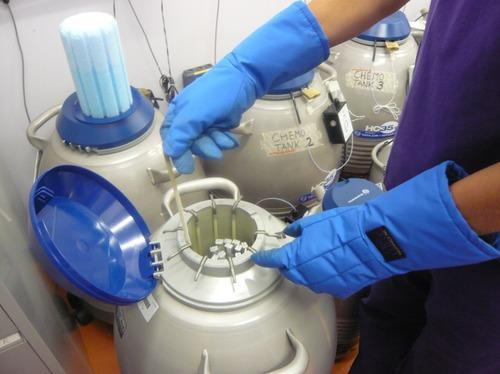Embryo Freezing
Preserve your good quality embryos in preparation for any subsequent treatment
Introduction
Embryos can be frozen as part of your IVF treatment cycle where any excess embryos of notable good quality have not been transferred, or embryos can be frozen as a stand-alone process for fertility preservation purposes. All frozen embryos are stored on site at our clinic in accordance with regulations

Why ?
If you are undertaking an IVF cycle, you will be advised of the availability of any excess good quality embryos that can be frozen in preparation for any subsequent treatment. Alternatively, if you are likely to be undergoing medical treatment for cancer or other illness which may affect your fertility in the future, you may choose to create embryos now with your partner, to preserve your fertility ready for use in a future treatment cycle.
Our counsellors are always available to discuss the legal implications of consent withdrawal once embryos are frozen and hence may advise patients undergoing fertility preservation for medical reasons to consider freezing part of their gametes as this gives them the sole right of their use in the future.
How ?
Cryopreservation of embryos involves removing any water within the cells of the embryo followed by rapidly cooling the embryos to –196ºC and storing them in liquid nitrogen. All cryopreservation at Rawal fertility is performed using vitrification, which has been found to produce higher survival and live birth rates when compared to the alternative methods of freezing (known as ͚slow-freezing͛). Embryo survival can only be assessed upon thawing of the embryo. Not all embryos survive the freezing and thawing process, but on average, over 95% of blastocysts will survive.
What's next ?
If you have requested cryopreservation of your embryos as a stand-alone procedure, you will be required to undertake part of an IVF cycle up to the point of egg collection. Once your eggs are collected and fertilized using IVF/ICSI/IMSI, the embryos would be monitored and frozen at any time between days 3 to 6. Our embryologist will select the best embryos to freeze based on quality.
The HFEA allows embryos to be stored for up to ten years initially. This period can be extended in certain circumstances for up to 55 years, in 10 year increments. When you choose to use your frozen embryos, we will prepare for a frozen embryo transfer (FET).
